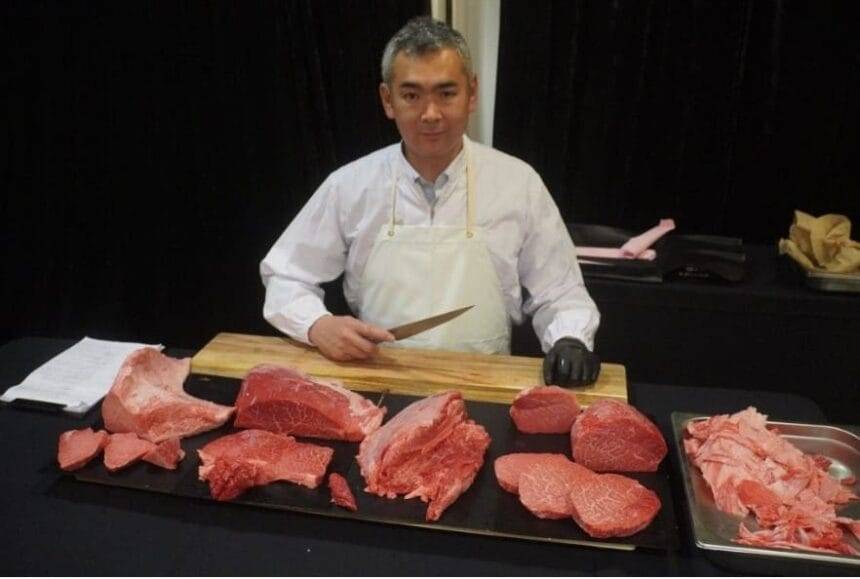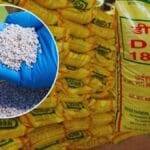Main Points In Hindi (मुख्य बातें – हिंदी में)
-
जापान का गांठदार त्वचा रोग (एलएसडी) का पहला मामला: जापान ने 6 नवंबर को गांठदार त्वचा रोग का पहला मामला दर्ज किया और इसके तुरंत बाद अपने वाग्यू गोमांस के निर्यात पर अस्थायी निलंबन लगा दिया।
-
निर्यात फिर से शुरू: जापान ने 20 नवंबर को ऑस्ट्रेलिया और अन्य अंतरराष्ट्रीय बाजारों में वाग्यू गोमांस निर्यात को फिर से शुरू किया, लेकिन यह हांगकांग और ताइवान जैसे कुछ देशों के लिए सीमित है, जहाँ केवल डेयरी उत्पादों को अनुमति दी गई है।
-
जैव सुरक्षा दिशा-निर्देशों में बदलाव: ऑस्ट्रेलिया ने पिछले वर्ष अपने मांस आयात दिशानिर्देशों को संशोधित किया है ताकि एलएसडी के जैव सुरक्षा जोखिमों को बेहतर तरीके से प्रबंधित किया जा सके। रिपोर्ट में कहा गया है कि अब अनुमोदित देशों से गोमांस के आयात को जैव सुरक्षा के आधार पर अनावश्यक रूप से प्रतिबंधित नहीं किया जाएगा।
-
टीकाकरण की योजना: फुकुओका क्षेत्र में संक्रमण के मामलों की पुष्टि के बाद, जापानी सरकार ने मार्च के अंत तक लगभग 5000 मवेशियों के टीकाकरण का कार्यक्रम लागू करने की योजना बनाई है।
- बीफ सेंट्रल की प्रतिक्रिया: बीफ सेंट्रल द्वारा संपर्क किए गए आपूर्ति श्रृंखलाओं की प्रतिक्रियाएँ मिश्रित थीं; कुछ ने कहा कि पूछताछ में वृद्धि हुई है, जबकि अन्य ने शुरुआती प्रतिक्रिया में कमी की ओर इशारा किया है।
Main Points In English(मुख्य बातें – अंग्रेज़ी में)
Here are the main points from the provided text:
-
Resumption of Wagyu Beef Exports: Japan has resumed its Wagyu beef exports to Australia and other international markets after briefly suspending shipments following the discovery of the first case of Lumpy Skin Disease (LSD) in the country.
-
Discovery and Immediate Action: The first case of LSD was reported in Japan on November 6, leading to a temporary suspension of Wagyu beef exports. The Japanese government has reported numerous infected cattle in several farms and plans to vaccinate thousands of cattle in affected regions.
-
Bilateral Discussions: Following discussions between Japanese agriculture officials and their Australian counterparts, the suspension was lifted, allowing exports to resume from non-affected areas. Import permits for boneless Wagyu beef were issued to Australian importers.
-
Regulatory Changes in Australia: Australia updated its meat import guidelines to be in line with international standards regarding LSD risks, allowing imports from countries with adequate controls despite previous policies that required meat to be sourced only from LSD-free nations.
- Impact on Trade and Biosecurity: The changes aim to ensure trade continuity while managing biosecurity risks effectively. Current import permits and trade arrangements will remain valid to support ongoing trade and meet international obligations.


Complete News In Hindi(पूरी खबर – हिंदी में)
जापान ने देश में पहली बार गांठदार त्वचा रोग का पता चलने के बाद इस महीने की शुरुआत में स्वेच्छा से शिपमेंट को निलंबित करने के बाद, इस सप्ताह ऑस्ट्रेलिया और कुछ अन्य अंतरराष्ट्रीय बाजारों में वाग्यू गोमांस निर्यात फिर से शुरू कर दिया है।
जापान ने 6 नवंबर को अपना पहला एलएसडी मामला दर्ज किया, और तुरंत अपने वाग्यू गोमांस निर्यात पर अस्थायी निलंबन लगा दिया।
डीएएफएफ जारी किया गया यह जैव सुरक्षा सलाह दस दिन बाद 18 नवंबर को वापस बीफ़ सेंट्रल ने सबसे पहले प्रकोप की सूचना दी.
20 नवंबर तक, फुकुओका क्षेत्र के आठ फार्मों में दर्जनों संक्रमित मवेशियों की पुष्टि हो चुकी थी। प्रीफेक्चुरल सरकार ने मार्च के अंत तक संक्रमण क्षेत्र के 20 किमी के दायरे में 50 खेतों में लगभग 5000 मवेशियों का टीकाकरण करने की योजना लागू की।
जापानी कृषि, वानिकी और मत्स्य पालन मंत्रालय और ऑस्ट्रेलियाई अधिकारियों के बीच चर्चा के बाद, इस सप्ताह निलंबन हटा दिया गया, प्रारंभिक व्यापार फुकुओका क्षेत्र के अलावा अन्य क्षेत्रों से गोमांस तक सीमित था जहां डेयरी मवेशियों में एलएसडी के एकमात्र मामले पाए गए थे। विशिष्ट जापानी-निर्मित वाग्यू गोमांस के स्थानीय ऑस्ट्रेलियाई आयातकों को सोमवार (25 नवंबर) से बोनलेस गोमांस के लिए आयात परमिट प्राप्त हुए।
व्यापार से जुड़े एक सूत्र ने बीफ सेंट्रल को बताया कि हांगकांग और ताइवान (केवल डेयरी उत्पाद) सहित अन्य ग्राहक देशों पर प्रतिबंध 18 नवंबर को वापस ले लिया गया, जबकि टीकाकरण वाले मवेशियों के गोमांस के लिए संयुक्त राज्य अमेरिका में व्यापार फिलहाल बंद है। इस बात की पुष्टि करने के लिए एक प्रणाली के बारे में चर्चा चल रही है कि टीका लगाए गए मवेशियों को अमेरिका की सेवा करने वाली जापानी निर्यात गोमांस प्रसंस्करण सुविधाओं तक नहीं पहुंचाया जा रहा है।
जापान हर साल ऑस्ट्रेलिया में केवल छोटी मात्रा में, लेकिन अत्यधिक संगमरमर वाले वाग्यू गोमांस की अत्यधिक कीमत वाली खेप की आपूर्ति करता है, जिसका उपयोग ज्यादातर पांच सितारा रेस्तरां और होटलों में किया जाता है।
निलंबन हटाने से पहले, बीफ सेंट्रल ने हाई-एंड फुलब्लड वाग्यू बीफ के उत्पादन में विशेषज्ञता रखने वाली कई ऑस्ट्रेलियाई आपूर्ति श्रृंखलाओं से पूछा कि क्या जापान द्वारा तीन सप्ताह पहले निलंबन लगाए जाने के बाद से जांच हटा ली गई है। प्रतिक्रियाएँ मिश्रित थीं, कुछ ने कहा कि पूछताछ काफ़ी बढ़ गई है, जबकि अन्य ने कहा कि प्रारंभिक चरण में कोई स्पष्ट प्रतिक्रिया नहीं थी।
जैव सुरक्षा परिवर्तन
ऑस्ट्रेलिया ने पिछले साल के अंत में ओआईई अंतरराष्ट्रीय मानकों के अनुरूप होने के लिए एलएसडी जोखिम से संबंधित अपने मांस आयात दिशानिर्देशों में संशोधन किया।
आयातित ताजा या जमे हुए गोमांस के माध्यम से एलएसडी के जैव सुरक्षा जोखिमों की कृषि विभाग की समीक्षा ने पिछले दिसंबर में पूरी की, 2017 में स्थापित पिछली नीति को बदल दिया, जहां गोमांस केवल एलएसडी मुक्त देशों से आयात किया जा सकता था।
“अंतिम रिपोर्ट यह निष्कर्ष निकालती है कि पर्याप्त प्रकाशित विज्ञान मौजूद है, अंतरराष्ट्रीय मानकों के अनुरूप, यह प्रदर्शित करने के लिए कि गोजातीय कंकाल की मांसपेशियों के माध्यम से एलएसडी की संप्रेषणीयता जो कि ऑस्ट्रेलियाई और अंतरराष्ट्रीय मानकों के अनुसार उत्पादित की गई है, एलएसडी-विशिष्ट स्थितियों के बिना, ऑस्ट्रेलिया के उचित स्तर की सुरक्षा प्राप्त करती है। रिपोर्ट में कहा गया है।
रिपोर्ट में सलाह दी गई है कि अनुमोदित देशों से विशेष रूप से गोजातीय कंकाल की मांसपेशियों से प्राप्त ताजा गोमांस के आयात को कवर करने के लिए एलएसडी से देश की आजादी का प्रमाणीकरण जैव सुरक्षा के आधार पर अनावश्यक है।
कुछ लोगों ने विनियामक परिवर्तन की व्याख्या इस रूप में की है कि ऑस्ट्रेलिया को विपरीत स्थिति के लिए तैयार रहने की आवश्यकता है – इस देश में एलएसडी का प्रकोप, और इसका हमारे अपने अंतरराष्ट्रीय गोमांस निर्यात पर क्या प्रभाव पड़ सकता है। सूत्रों ने बीफ़ सेंट्रल को बताया कि यदि ऐसा होता है तो ज़ोन-आधारित बहिष्करण सर्वोत्तम संभव परिणाम होगा।
ऑस्ट्रेलिया के बायोसिक्योरिटी इंपोर्ट कंडीशंस डेटाबेस (BICON) को ऊपर वर्णित परिवर्तनों को प्रतिबिंबित करने के लिए अद्यतन किया गया है, जिससे व्यापारिक साझेदारों को यह सुनिश्चित करने के लिए अतिरिक्त प्रमाणीकरण का प्रस्ताव करने की अनुमति मिलती है कि व्यापार जारी रह सकता है, एलएसडी के लिए उनके पशु स्वास्थ्य की स्थिति में बदलाव होना चाहिए, पशु जैव सुरक्षा के लिए DAFF के सहायक सचिव डॉ. पीटर फिनिन ने कहा।
हालाँकि, चूंकि वर्तमान जैव सुरक्षा जोखिमों को मौजूदा आवश्यकताओं के तहत प्रभावी ढंग से प्रबंधित किया जाता है, इसलिए ताजा गोमांस और गोमांस उत्पादों के लिए सभी मौजूदा आयात परमिट और व्यापार व्यवस्थाएं वैध रहेंगी, डीएएफएफ ने कहा।
“यह दृष्टिकोण व्यापार की निरंतरता सुनिश्चित करता है। डीएएफएफ ने कहा कि यह ऑस्ट्रेलिया के उचित स्तर की सुरक्षा के अनुसार जैव सुरक्षा जोखिमों का प्रबंधन भी करता है और अंतरराष्ट्रीय व्यापार दायित्वों को पूरा करता है।
Complete News In English(पूरी खबर – अंग्रेज़ी में)
Japan has resumed exports of Wagyu beef to Australia and some other international markets after voluntarily suspending shipments earlier this month due to the discovery of Lumpy Skin Disease (LSD) in the country.
The first case of LSD in Japan was reported on November 6, which led to an immediate temporary suspension of Wagyu beef exports. The Department of Agriculture, Fisheries and Forestry (DAFF) issued a biosecurity advisory on November 18, ten days after the initial suspension.
As of November 20, dozens of infected cattle had been confirmed on eight farms in the Fukuoka region. The local government plans to vaccinate about 5,000 cattle across approximately 50 farms within a 20 km radius of the infection area by the end of March.


Following discussions between Japanese agricultural officials and Australian authorities, the suspension was lifted this week, allowing beef exports to resume from regions other than Fukuoka, where the disease was first identified. Australian importers of Japanese Wagyu beef received import permits for boneless beef starting Monday, November 25.
According to sources in the beef trade, restrictions on other countries, including Hong Kong and Taiwan for dairy products, were lifted on November 18. However, beef trade with the United States remains paused while systems are put in place to ensure that vaccinated cattle are not sent to Japanese processing facilities servicing the U.S. market.
Japan typically supplies only a small amount of very high-priced, marbled Wagyu beef to Australia, mainly for use in five-star restaurants and hotels.
Before the suspension was lifted, Beef Central inquired with several Australian suppliers specializing in high-end full-blood Wagyu beef about whether investigations had been concluded since Japan’s suspension began three weeks prior. Responses varied, with some reporting increased inquiries and others seeing no clear reaction during the initial phase.
### Biosecurity Changes
Australia amended its meat import guidelines related to LSD risks at the end of last year to align with international standards set by the World Organisation for Animal Health (OIE).
The Department of Agriculture’s review of biosecurity risks from LSD through imported fresh or frozen beef concluded last December, changing the previous policy from 2017 that allowed beef imports only from LSD-free countries.
The final report indicated that sufficient scientific evidence exists to show that the transmission of LSD through beef produced according to Australian and international standards provides adequate safety levels without specific LSD-related conditions.
The report advised that certification of LSD freedom is unnecessary for imports of fresh beef derived from skeletal muscle from approved countries.
Some interpreted these regulatory changes as a need for Australia to prepare for a potential LSD outbreak within its borders and its impact on international beef exports. Sources mentioned that if such an outbreak occurs, a zone-based exclusion would be the best approach.
Australia’s Biosecurity Import Conditions database (BICON) has been updated to reflect these changes, allowing trade partners to propose additional certifications to ensure continuity of trade, according to DAFF’s Assistant Secretary for Animal Biosecurity, Dr. Peter Finney.
However, since current biosecurity risks are being effectively managed under existing requirements, all current import permits and trade arrangements for fresh beef and beef products will remain valid, DAFF confirmed.
This approach ensures the continuity of trade, manages biosecurity risks in accordance with Australia’s standards, and fulfills international trade obligations.
Source link




